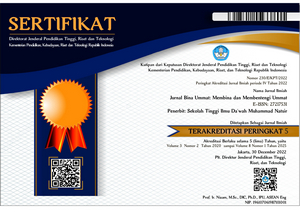PENERAPAN GREEN ECONOMY DALAM MENCAPAI PEMBANGUNAN EKONOMI BERKELANJUTAN
DOI:
https://doi.org/10.38214/jurnalbinaummatstidnatsir.v6i2.195Keywords:
Green Economy; Economic Development; Sustainable Economic Development.Abstract
This study aims to analyze various applications of green economy as an effort to achieve sustainable economic development. The study used qualitative descriptive methods. Data collection techniques use literature studies. Data analysis using Miles and Huberman which includes data reduction, data presentation, and conclusions. The results show that the implementation of green economy is an effort to achieve sustainable economic development. This is because the concept of green economy can achieve 5 (five) results simultaneously forming the Green Economic Growth Framework, namely sustainable economic growth; inclusive and equitable growth; social, economic, and environmental resilience; healthy and productive ecosystems provide environmental services; and reduction of greenhouse gas emissions. The green economy launched in Indonesia can be applied in various sectors divided into four groups, namely (1) energy and extractive industries, (2) manufacturing industries, (3) connectivity, and (4) renewable natural resources. In implementing the green economy, it requires the involvement of various parties, ranging from the government as policy makers, business actors, and the general public who have the most activities that cause environmental impacts. Education and action need to be carried out by various parties to care more about the environment in order to reduce the adverse effects of environmental damage that threaten the sustainability and welfare of the community and all living things and their ecosystems.
Published
Issue
Section
This work is licensed under a Lisensi Creative Commons Atribusi 4.0 Internasional.
Authors who publish with this journal agree to the following terms:
- Authors retain copyright and grant the journal right of first publication with the work simultaneously licensed under a�Creative Commons Attribution License that allows others to share the work with an acknowledgment of the work's authorship and initial publication in this journal.
- Authors are able to enter into separate, additional contractual arrangements for the non-exclusive distribution of the journal's published version of the work (e.g., post it to an institutional repository or publish it in a book), with an acknowledgment of its initial publication in this journal.
- Authors are permitted and encouraged to post their work online (e.g., in institutional repositories or on their website) prior to and during the submission process, as it can lead to productive exchanges, as well as earlier and greater citation of published work (See�The Effect of Open Access).




